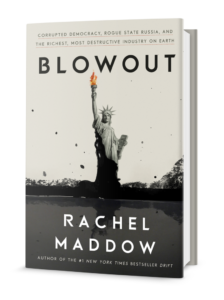
A book on the oil and gas industry, Russia, and government corruption? Sounds a bit daunting. But Rachel Maddow, host of MSNBC’s The Rachel Maddow Show, author of The New York Times best seller Drift: The Unmooring of Military Power, and part-time Provincetown resident, has written a page-turner on those very subjects — Blowout: Corrupted Democracy, Rogue State Russia, and the Most Destructive Industry on Earth, published by Crown this month.
She argues that the fossil fuel industry’s thirst for profits can subvert moral standards, proper stewardship of the earth’s resources, and good governance, both in the United States and abroad. Maddow covers a wide variety of topics to make her case, such as the industry’s use of fracking, the Sochi Olympics, the Russian annexation of Crimea and interference in the 2016 elections, and the British Petroleum oil spill and corruption in Equatorial Guinea, and she manages to tie it all together seamlessly.
What could have been a professorial and overly detailed book is lifted by Maddow’s playfully saucy tone of reporting, familiar to viewers of her nightly show. Blowout is informative and fast-paced, even cynical and sarcastic at times. For instance, Maddow reports on the harm being done by hydraulic fracking — opening and widening gaps in the earth by injecting chemicals and liquids at high pressure to extract natural gas and oil. She notes that a correlation exists between drilling and more frequent earthquakes in Oklahoma. Of course, energy companies suppress scientific data that shows that correlation. When one of Oklahoma’s top oil and gas executives tells a reporter that he wants to hear all the facts connecting drilling to seismic events, Maddow writes, “Uh-huh, sure he did.”

Maddow examines all manner of debacles caused by Big Oil, from the 2010 Deepwater Horizon oil spill at the BP-operated Maconda Prospect in the Gulf of Mexico to, switching hemispheres, the corruption of the petrostate Equatorial Guinea, where profits from the nation’s oil went directly into the pockets of President Obiang at the expense of an impoverished populace.
At the center of Maddow’s story is Russia and Vladimir Putin. Sitting atop one of the world’s largest oil and gas reserves, Putin could have funded a “rich and loamy bed in which a modern republic would grow,” Maddow writes. But that would have been hard work. Instead, Putin took the easy path. He took control of the country’s fossil fuel resources and used it to expand his power and wealth. Now Russia’s economy is dependent on one industry, “monopolized by its big, lousy, noncompetitive state-controlled oil and gas companies, which are all run by spies or thugs or judo guys, almost exclusively for the benefit of Vladimir Putin and his global aims.”
Putin’s oil and gas companies lacked the technology needed to extract the natural gas that lay beneath the Russian tundra and under the Arctic Ocean. Enter ExxonMobil, which was more than willing to work with them. Then, in 2014, Putin annexed the Crimean Peninsula and supported separatists in Eastern Ukraine, resulting in heavy sanctions by the U.S. government that effectively froze his assets and ended ExxonMobil’s involvement.
Here is where Maddow connects the dots. Russia’s interference with the 2016 elections, which assisted candidate Trump, was an effort to restore Putin’s golden goose. “What Russia needed right then — like a junkie long past his last hit — was sanctions relief,” Maddow writes.
Throughout the book Maddow shows the harm oil and gas giants do when they are not restrained. She makes a case for more and better government regulations to mitigate the evils that fossil fuels are visiting on our world. She argues that energy companies can’t really help it — it’s just who they are.
“What is the point of outrage at oil and gas producers? It’s like being indignant when a lion takes down and eats a gazelle,” Maddow writes. “You can’t really blame the lion. It’s who she is: it’s in her nature.”
